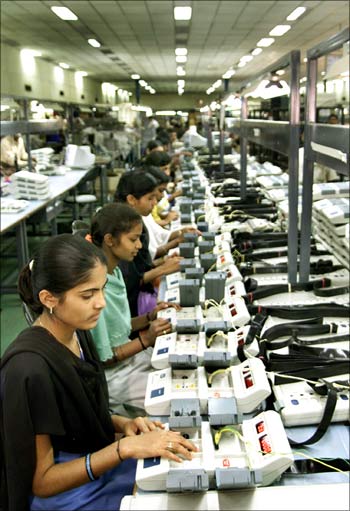
Just a week after she appeared for her third semester exam in a middle-rung business school in Kolkata, a former colleague's daughter received a job offer from a large consultancy, and an interview for a second is on the way.
Just six months ago, she was taking about an uncertain future because about half of the 80-strong previous batch had firm job offers through the institute's placement cell.
So it's almost back to those good old days of 2007 when it became almost impossible for companies either to get quality workers and/or appropriately trained managers.
So companies of all shapes and sizes were rushing to even relatively small professional institutes to recruit. That explains why the placement cells in colleges such as the National Institute of Technology (NIT) in Kurukshetra or Vellore Institute of Technology University are on cloud nine these days.
NIT had 115 companies on campus for placement (against an average of 70 till last year) and Vellore Institute saw Cognizant pick up over 1,600 students this year.
. . .

The keenness to hire is, of course, not restricted to B-schools and engineering colleges; even small job fairs in rural India are attracting some of the biggest names in corporate India.
Example: the first-ever job fair in Sonepat organised by TeamLease and Indian Institute of Job Training on Wednesday saw many companies holding career counselling sessions with over 10,000 jobseekers.
For a sure sign of a more vibrant job market, look at the sharp increase in help-wanted signs in store-fronts and the frenetic activity among headhunters. Both were absent even six months ago.
No wonder, then, that all HR studies on the jobs outlook are talking about a brisk to dynamic growth in employment opportunities in the New Year.
The Manpower Employment Outlook Survey says the net employment outlook is 42 per cent, 5 per cent more than the same period last year, making Indian employers the most optimistic as far as hiring intentions are concerned globally.
. . .

Another study by Ma Foi Randstad last week said led by healthcare, the organised sector in India has added 1.13 million jobs this year, making it the best in the last four years, ahead of the previous peak in 2006 when 1.03 million jobs were added.
This is a significant growth over 2008 when only 670,000 jobs were added. The number last year was 900,000.
Sectors like hospitality, real estate and construction, IT & ITeS joined the 100,000-plus jobs pack in 2010. And among the cities surveyed, Delhi and NCR have reported greatest employment generation by creating 113,897 jobs in 2010.
Is it any surprise, then, that Indian employees are more prone to switch employers compared to others in the world at this point?
A global work monitor study by Ma Foi earlier showed that amongst the 25 countries surveyed, India has the highest index of 141, meaning that the maximum employee churn across the globe will be here. India is followed by China and Mexico.
. . .

The mobility index is based on employees' responses to two questions about their intent to change jobs. The first question was about changing the current employer for a comparable job in the next six months.
The second question was about changing the current employer for a different job or profession in the next six months.
Most HR consultancy firms say they are projecting a salary increase of 8 to 16 per cent in 2011 with sectors like telecom and pharma leading the pack.
Global HR consulting firm Mercer says it has revised its forecasts for 2011 and has made an upward correction in the salary hikes expected due to the positive sentiment running across industries at large.
Examples such as these should bring cheer to a workforce that has had a tough time recently. But while it is certainly true that the days of gloomy messages of pay cuts and pink slips are over, here is a word of caution for employers.
. . .

Many HR consultants say some Indian companies should fix a speed limit so that they don't get caught in those days of an imbalance in hiring by not following quality hiring norms.
Consultants say companies need to be more focused on the difference between performers and non-performers, and spend more time on the screening process. In the last boom, companies started tolerating even marginal contributors; that shouldn't happen.
Also, institutional shareholder activism in India, though muted so far, could rise if salaries to top executives are out of tune with their contribution.
This is a common practice abroad: HSBC, for example, faced vocal opposition from shareholders to its remuneration scheme, which saw executive directors receive bonus awards that ranged from more than double to almost four times their base salary.
Though the 20 per cent of shareholders who abstained or voted against was not enough to prevent the compensation scheme being passed, there are signs that shareholders will no longer give boards an easy ride.